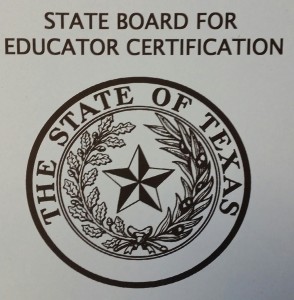SBEC wraps final 2017 meeting, announces joint conference with SBOE

Educator Preparation | Certification
Date Posted: 12/11/2017

The State Board for Educator Certification (SBEC) met for the final board meeting of the year to act on and discuss an agenda filled with a number of topics, including revisiting a controversial proposal to certify “non-traditional” superintendent candidates.
Bills from the 85th legislature make their way through rulemaking
The board gave final approval (all finally approved rule proposals are still subject to review by the State Board of Education) to new disciplinary rules triggered by elements of Senate Bill (SB) 7, a bill passed by the 85th Legislature that involved disciplinary sanctions for educator misconduct related to inappropriate relationships; and approved new grade-band pedagogy and professional responsibilities (PPR) standards that include PPR standards for the new legislatively required EC-3 certificate.
The board gave initial approval (all initially approved rule proposals are posted for public comment and review in the Texas Register before being considered for final approval at the following meeting) to a rule that establishes the content standards and the science of teaching reading standards for the new EC-3 certificate, as well as one that clarifies certain continuing professional education (CPE) requirements, among other CPE rule revisions related to certificate renewal.
Revisit of non-traditional superintendent certificate rejected for now
The item on Friday’s agenda that seemed to get the most attention from stakeholders was one involving a pathway to certification for certain individuals wanting to become superintendents without the required experience. At the request of one board member, the board considered and ultimately chose not to revisit a previously rejected proposal that would have created a path to becoming a superintendent without prior experience in the classroom, a school, or a managerial role.
The proposal originally surfaced in 2015 and, at the time, had two parts: (1) a pathway for candidates who have managerial experience in a school setting outside of the required teaching and principal experience, and (2) a much broader pathway that allowed anyone with a post-baccalaureate degree whom a school board deems appropriate to seek certification as long as the school board publicly posts why the selected candidate is qualified. ATPE opposed both alternative pathways. The board originally opted by a margin of one vote to approve the proposal that included both pathways, but it was later rejected by the SBOE based on the second piece of the proposal only. Eventually, only the proposal involving prior management experience in a public school system went into effect (in February 2016). Last week’s SBEC discussion on this topic was focused on revisiting the controversial piece of the proposal that never became rule.
ATPE again testified against the irresponsible and unnecessary pathway and opposed the board’s need to revisit the proposal at last Friday’s meeting. ATPE Lobbyist Kate Kuhlmann urged board members not to move forward with the proposal, testifying that ATPE members strongly believe that “classroom teaching experience, in addition to managerial experience and a strong educational background, is a critical contributing factor to the success of an administrator.” Kuhlmann pointed out that rejecting the attempt to weaken the superintendent certification standards would be in alignment with the board’s core principles, which acknowledge student success as primary and high standards for preparation and certification as paramount; in alignment with the superintendent standards adopted by the board that reflect learner focused values; and in alignment with what a chorus of educators in the field are communicating is needed to lead a school system. (All four teacher groups and school administrators opposed revisiting the proposal.)
The motion to reconsider the proposal ultimately failed, but the chapter covering superintendent certification will be up for scheduled review beginning in August 2018, giving board members advocating for the change another chance to push the controversial proposal.
ATPE member advocates to raise standards for educator preparation
Stephanie Stoebe, an ATPE member in Round Rock ISD, attended Friday’s SBEC meeting to testify on a proposal involving educator preparation programs and the candidates attending them. Specifically, her testimony focused on a piece of the proposal involving experience gained as a long-term substitute, something she’d previously discussed with the Texas legislature as it weighed the new provision in law earlier this year. She encouraged SBEC to increase the days constituting a long-term substitute as it relates to substituting field-based experience requirements for teacher certification candidates. The board’s original proposal defined a long-term substitute assignment as one made up of at least ten consecutive days. Stoebe recommended it be increased to 30 consecutive days, which is “about the amount of time it takes to teach one unit,” Stoebe told board members.
Board members expressed vocal agreement with regard to increasing the consecutive day requirement and asked Texas Education Agency (TEA) staff to get input and bring the proposal back with the increased standard. The proposal was only a discussion item on last week’s agenda; SBEC is expected to revisit the revised proposal for initial approval at its next meeting in March.
SBEC to host conference with SBOE in January
SBEC and SBOE will host a free, one-day conference on Thursday, January 25, from 8:30 am to 4:30 pm at the Austin Convention Center. The conference, titled Learning Roundtable: Recruiting, Preparing, and Retaining Teachers, will focus on the three title topics and include relevant panel discussions throughout the day.
Attendees are eligible to receive up to 5.5 hours of CPE credit. To learn more about the conference or to register for the event at no cost, visit the TEA web page dedicated to the event.
CONVERSATION
RECOMMENDED FOR YOU

12/12/2025
Dec. 8 filing deadline sets the stage for 2026 elections
Now’s the time to confirm your voter registration and update it if necessary.

12/12/2025
Teach the Vote’s Week in Review: Dec. 12, 2025
TEA announces plans to take over Lake Worth, Connally, and Beaumont ISDs. Plus: The ATPE Podcast is back with a refreshed format.

12/12/2025
From The Texas Tribune: Texas Education Agency taking over Lake Worth, Connally and Beaumont school districts
The three interventions come after the state’s education agency announced plans to take over Fort Worth ISD in October.

